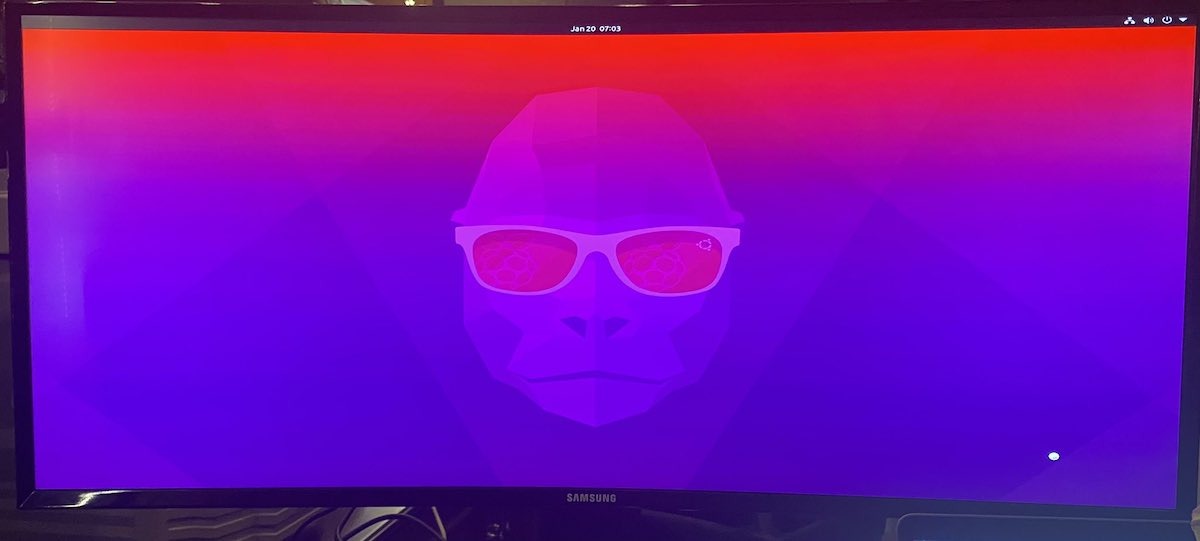Security researchers at Corellium have ported a version of Linux to the Apple Silicon M1 chip that will ultimately be released under an open-source license.
The Linux version is a full Ubuntu desktop operating system booted from a USB, according to Corellium Chief Technology Officer Chris Wade. Although details are scarce, he said that Linux is now "completely usable" on Apple Silicon machines.
Network compatibility is possible through a USB-C dongle, and the current update to the platform will support USB, I2C, and DART. The Ubuntu operating system is one initially meant for the ARM-based Raspberry Pi, Wade added.
Linux is now completely usable on the Mac mini M1. Booting from USB a full Ubuntu desktop (rpi). Network works via a USB c dongle. Update includes support for USB, I2C, DART. We will push changes to our GitHub and a tutorial later today. Thanks to the @CorelliumHQ team pic.twitter.com/uBDbDmvJUG
— Chris Wade (@cmwdotme) January 20, 2021
There are some limitations to the port. While it can take full advantage of the M1 CPU, it won't support GPU acceleration. That means graphics are currently set to software rendering mode, which will mean much slower graphical performance versus native performance in macOS.
The Corellium team first teased the Linux port to Apple Silicon earlier in January, though offered few other details. Earlier versions of the port on Github were for "advanced users only," since they lacked support for USB and other key systems.
We had some spare time today so we ported Linux to the M1. Releasing tomorrow #fridayfun pic.twitter.com/dCrXApyKef
— Corellium (@CorelliumHQ) January 16, 2021Members of the team that developed the checkra1n jailbreak for iPhone devices also worked on the Linux port, including security researchers Longhorn and qwertyoruiopz. On Friday, Longhorn said that the Linux port is "very promising," but noted that more invasive kernel changes would be needed because the system-on-chip is "atypical."
Wade also noted that users may be able to boot Linux on an Apple Silicon chip using pongoOS, which is a pre-boot execution environment built on top of checkra1n. The checkra1n jailbreak itself takes advantage of the checkm8 exploit that was discovered in 2019.
On Jan. 16, qwertyoruiopz tweeted several images of pongoOS booting on an M1 Mac.
fully booting now! thanks to @CorelliumHQ and @never_released for assistance pic.twitter.com/lpszsBrjBH
— qwertyoruiop (@qwertyoruiopz) January 16, 2021
Corellium is a software virtualization firm focused on emulating ARM-based technologies. The firm is also known for its legal battle with Apple. The Cupertino tech giant levied a copyright infringement lawsuit against Corellium in 2019 because of its iOS emulation software. In December 2020, Apple lost that lawsuit.
As of writing, Corellium has pushed the latest changes to the Linux for M1 port to its Github account. Wade also said that a tutorial would be arriving on Friday.
 Mike Peterson
Mike Peterson







-m.jpg)






 Brian Patterson
Brian Patterson
 Charles Martin
Charles Martin


 Malcolm Owen
Malcolm Owen
 William Gallagher
William Gallagher
 Christine McKee
Christine McKee
 Marko Zivkovic
Marko Zivkovic









13 Comments
I wonder how they are able to load the kernel image at all. The tutorial should answer, but from the mention of pongoOS, I suspect they are exploiting some flaw in the secure boot process itself to load an arbitrary image and pass execution to it.
Reading through the commit for DART support, it looks like Apple did indeed design their own IOMMU core rather than using ARM's reference SMMU.
Awesome news.
One good news after other for "M" Macs.